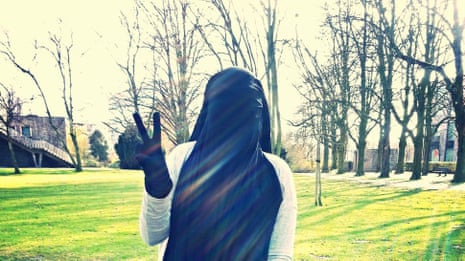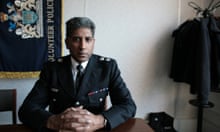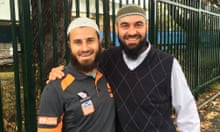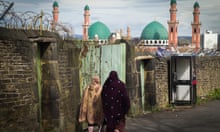Maysa watches the streets of Brussels through the bus windows. Cafes, a town hall, shops, offices, pavements grey in the November rain. Her thoughts are elsewhere.
“I was so nearly there, just hours from leaving. I was there in my head: in Syria, with Islamic State,” the 18-year-old says.
Maysa had been like many other teenagers – at least those in her neighbourhood on the outskirts of the Belgian capital. Her grandparents had come from Morocco almost 50 years ago, and her parents had been modestly successful in building careers and a home for their children. She speaks two local languages – French and Flemish – fluently, as well as Arabic and some English picked up at school and from music. Her parents are observant Muslims, but far from rigorous. Her marks at school were good and she had lots of friends.
“My teacher called me a ray of sunshine,” says Maysa, whose real name has been withheld at her request.
A year ago, that sunshine dimmed. First she donned a jilbab, the loose gown and headscarf worn by some devout or traditional Muslim women. There was no more dancing or singing – favourite pastimes before – and no more cigarettes either. There was no more music, whether her preferred American gangsta rap or anything else. Maysa had never drunk alcohol but went out with friends who did. That ended too.
Only now is she coming to terms with what happened. “I look back and it is like a black hole,” she says.
It is impossible to corroborate all of Maysa’s account of her journey into radicalism but social workers who know her well have confirmed many elements while experts say her story is “depressingly familiar”.
The first approach came through social media.
Maysa had initially adopted the jilbab to “hide some weight I’d put on”, she says. But when she posted a selfie wearing her new clothes on social media, she was contacted by another woman also in her late teens. They chatted about her “new look” and agreed to go shopping together. Maysa was introduced to a group of young women from a similar background to her own. All except one, a convert, were of immigrant origin and lived in Brussels’s poorer, though far from desperate, neighbourhoods.
Maysa saw her new friend, and the group, increasingly often. They met in cheap burger bars in the centre of Brussels, or cafes, but never at anyone’s home, or mosque, or religious centre.
First the conversation was about Islam, and the failures of many so-called Muslims. Then about politics, and the worldwide persecution of Muslims. Then finally about Isis, and life in the new “caliphate”, and how good life was there.
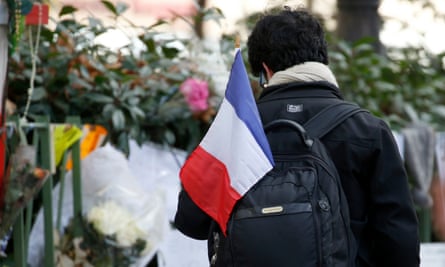
At least one of the women claimed to be in touch with Belgian militants in Syria, even boasting of making multiple trips to see her husband, a fighter there.
“They told me how there was no crime and no discrimination in the Islamic State. They spoke about relations between men and women, and said that I would find a good husband, even if I would be one of several of his wives. They spoke about fighting the unbelievers and the heretics, but never mentioned any violence or executions or anything like that,” Maysa says.
Within weeks, her new friends provided Maysa with a cheap mobile phone with a pre-paid sim card and told her to keep it secret. It was on this phone that she was contacted, usually by text message, and told where and when the next meeting of the group would take place.
“I now see I knew nothing about them, really. Just their first names. But I didn’t question it,” Maysa says.
It was clear that Belgium had an acute Islamist militancy problem well before the news that several of those who killed 130 people in Paris on 13 November had grown up in Brussels and possibly plotted the operation there. In the last 18 months a series of attacks have been launched in, or from, the country.
Through the last decade, Belgian networks funnelled volunteers to Afghanistan and Iraq. The current chaos in the Middle East drew a new wave. Up to 500 Belgians are thought to have travelled to Syria, one of the highest per capita totals anywhere in Europe. Among them are around 50 women.
This is not exceptional. Hundreds of young French and British women have also abandoned lives in the west to live in the territory ruled by Isis, which has claimed responsibility for the Paris attacks.
Some women drawn to extremism have disturbed backgrounds and marginal lives. One such was Hasna Aït Boulahcen, a French woman killed when police raided an apartment on the outskirts of Paris five days after the attacks in the French capital. Boulahcen had arranged the bolthole for the suspected leader of the attackers, her cousin.
Friends described Boulahcen as an unstable young woman from a troubled family who until recently smoked, drank vodka and partied. Six months before she died, the 26-year-old swapped sunglasses, jeans and cowboy boots for strict Islamic clothing and sent texts indicating she wanted to travel to Syria. Her mother told media she had been brainwashed by extremists.
“The families simply don’t see it coming. Many are actually happy that their kids have calmed down and stopped drinking or getting into trouble,” says Bachir M’Rabet, an educator working with young people in the Molenbeek neighbourhood of Brussels, where many of the Paris attackers grew up and where many Belgian militants are from.
Yet many female recruits, such as Maysa, come from stable homes, even if relations with parents are sometimes strained.
Johan Leman, an anthropologist and veteran anti-racism activist who also works in Molenbeek, says recruiters often tell teenagers their parents do not know “true Islam”. “They give a typical adolescent process [of rebellion] an Islamic dimension,” Leman says.

Within weeks of meeting her new friends, Maysa’s schooling was suffering. Within months, she was in trouble for absenteeism. She added gloves and a full face veil to her long gown.
Then came word that a young man to whom Maysa had once been close had died in Syria. He had travelled to the conflict two years earlier with a group of teenagers from Brussels who all frequented the same martial arts club. The bad news was exploited by her new acquaintances. “You have to do your duty. You have to go to Syria,” Maysa was told.
She saw the “sisters” more and more. The pressure intensified.
There was no discussion of other militant groups, broader political issues in Europe or the Muslim world, or even the teachings of well-known extremist scholars. Everything was focused solely on Isis. There was little discussion, either, of the fundamental texts of Islam.
“Everything we spoke about or [the literature] they showed me was straight from [Isis], or that’s what they said,” Maysa says. “I just got to the point where going [to Syria] was all I wanted to do. I believed what I heard. When afterwards I saw the videos of decapitations I cried.”
This too is typical of the current wave of extremist recruits, experts say. “It is outside politics or religion. It is about certain individuals who come together for the thrill of being part of something bigger. It is a youth subculture ... and peer groups play a big role,” says Professor Rik Coolsaet, a Brussels-based expert on Islamist militancy.
The crisis came early this spring. Maysa was told the group would be leaving within days. She could travel whether or not she had documents as “crossing frontiers was no problem”.
Yet something held her back. Maysa asked her mother where her passport was. Suspecting something, her parents had hidden it. Torn, she asked the group’s leader for time. There was none, she was told. And then came the threats: if she did not travel with them, Maysa would be tracked down, her family and friends too, and the consequences would be terrible.
This week Brussels remains on high alert with a “serious and imminent” threat of terrorist attack. It is seven months since Maysa smashed the “secret” phone she had been given on the rails of the city’s metro. She has not heard from the former friends since and does not want to. Their threats may not have been realised, but she has not forgotten them.
Maysa now wears jeans, T-shirts and sweaters as before. The painted finger nails are back, and so are the cigarettes. A coloured scarf is wound around her head. She is studying again, but is restless. She wants to leave Brussels, even Belgium, altogether and dreams of living and working in London, perhaps in the music industry.
On her mobile phone are pictures of a very different woman, fully veiled and flashing a “V for victory” sign.
“I was totally radicalised. I was not thinking my thoughts. I was not who I am,” she says.
